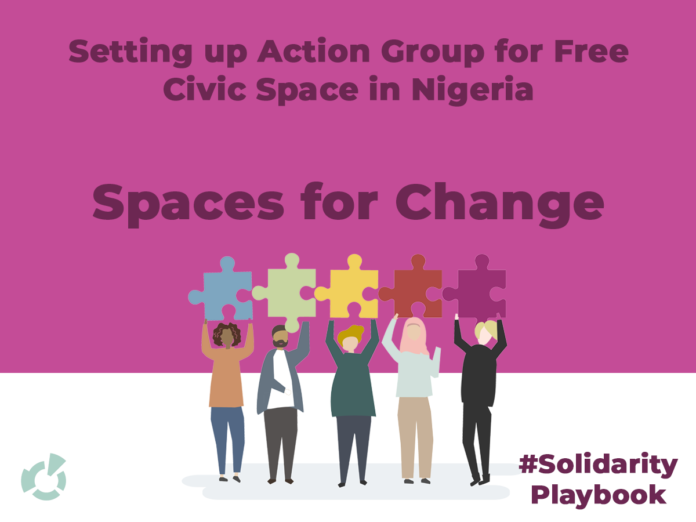By Ishaya Ibrahim, News Editor
Some provisions of the amended Companies and Allied Matters Act (CAMA) have been condemned by the Action Group on Free Civic Space, a watchdog coalition of 85 organisations whose primary objective they say is the protection of the civic space from being muscled by the Nigerian government.
In a statement signed by Okechukwu Nwanguma for Rule of Law and Accountability Advocacy Centre, Victoria Ibezim-Ohaeri for Spaces for Change, Ike Utsaha, for Cultural Communication and Legal
Resource Centre, Joy Ngwakwe for Center for Advancement of
Development Rights (CEADER), and 28 other civil society organisations, they say the new CAMA hold enormous potential to restrict the civic space and limit constitutionally-protected freedoms.
“The fixation on sacking an association’s trustees and taking over the administration or management of an associations property and bank credits is deeply worrying. The entirety of Section 839 (6) represents a new form of eminent domain (government right to expropriate private property),” they said.
The Action Group argued that the provisions that restrict the association’s transactions essentially take away their property rights just as much as an eminent domain does.
The groups observe that the amended CAMA contains a number of provisions that are punitive in nature and confer excessive powers on the government to overtly restrict or interfere with Non Profit Organisations (NPO) operations in Nigeria.
“There are no provisions enabling associations to use their internal controls to take corrective actions when their activities go off track. External intervention should only be initiated as a last resort where internal mechanisms have been inefficient in dealing with corporate governance Issues,” the Action Group on Free Civic Space noted.
The coalition is also alarmed that the new CAMA empowers Corporate Affairs Commission to dissolve an association with dormant bank accounts and transfer the amount standing to their credit to another or other associations.
The Action Group said the provision is obnoxious because it interferes with the rights of members of an association to freely dispose of their assets upon dissolution, and how owners can use or dispose of their property.
According to the Action Group, under the guise of public interest, the new CAMA empowers the CAC to unilaterally discard the trustees of an association and impose new trustees and manages without the consent of the members.
“Foisting interim managers and official custodians who do not share the same values and ideals with the members of an association, forcing unlike minds to come together to run the affairs of the body amid glaring disparities in their vision, cultural perceptions, ideas, and common goals,” the groups noted.
The Action Group said the new CAMA negates the constitutional guaranteed freedom of association, which gives a citizen the right to form, join and participate in associations, groups, movements and civil society organisations.
“CAMA 2020 Section 839(1) provisions do not meet the international obligations and standards of due process, as they infringe upon the freedom of association and restrict directly its operations by a discretion decision of the government body (the Commission). Any such decision should be a part of the judicial process because it constitutes a sanction, in its legal nature, towards the association and its governance and management structures. It also infringes on the independence of the association to choose their own governing and management affairs independently.
“By interfering with the rights of associations to associate and self-govern freely, Sections 838, 839 and 842 of CAMA 2020 contradict constitutionally-protected freedoms, especially the freedom of association. Furthermore, sections 838, 839 and 842 of CAMA 2020 are inconsistent with 43 and 44 of the 1999 Nigerian Constitution which guarantees the right to acquire and own property and to freely use and enjoy such property without interference. The combined force of Sections 43 and 44 of the Nigerian Constitution ensure the sanctity of all property, both movable and immovable, by prohibiting the taking of such property without cover of law, compensation, and access to the courts.
“The protections offered by Section 44 of the Constitution are broad, covering all types of property and forms of interest. As such, these protections extend not only to land, but also to immovable property, such as cash in banks, housing, and to moveable property, including office furniture and other items. Consequently, forced takeovers envisaged in the new CAMA prima facie violate the constitutional right to property, regardless of whether or not there has been misconduct or mismanagement in the administration of the association,” the groups noted.
The Action Group also faulted the power given to the Commission to investigate fraud, misconduct and mismanagement of an association, suspend the trustees of an association and appoint interim manager.
They argue that such investigative roles was an unnecessary duplicate of the roles of existing regulatory agencies charged with uncovering and punishing financial crimes such as the Special Control Unit Against Money Laundering and the Economic and Financial Crimes Commission (“EFCC”), established under the Economic and Financial Crimes Commission (Establishment) Act, 2004.
“More tellingly, all the new legal additions to the CAMA law create the potential for regulatory capture. When that happens, the Commission could hide under the cloak of omnibus clauses like ‘public interest’ to target particular organizations and divert their assets to other favored Associations,” they said.
The Action Group also noted that the duplicity of regulatory functions would also result in multiple reporting obligations to different entities.
“Increased reporting to multiple agencies means a higher workload for registered associations and non-profits in particular, requiring additional resources to ensure daily operations match regulations correctly. For many entities, especially the smaller non-profits, compliance with the plethora of reporting obligations to multiple entities can be burdensome as considerable time and resources are expended on satisfying legal requirements than on their actual humanitarian work,” the Action Group said.
The Action Group said the revisions to CAMA are particularly reminiscent of the prescriptions of the rested 2016 NGO Bill sponsored by Umar Buba Jibril, which also aimed to interfere with NGO assets.













